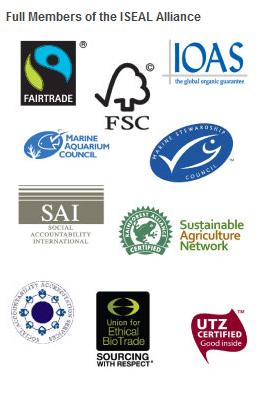China and the future of voluntary standards systems and my ISEAL Alliance presentation
 I spoke in June at the ISEAL Alliance annual conference, “Through the Looking Glass: The Future of Social and Environmental Standards,” in London on prospects for voluntary standards development in China and from a base in China. Here’s a bit of background and a summary of my presentation, now posted to the ISEAL Alliance website.
I spoke in June at the ISEAL Alliance annual conference, “Through the Looking Glass: The Future of Social and Environmental Standards,” in London on prospects for voluntary standards development in China and from a base in China. Here’s a bit of background and a summary of my presentation, now posted to the ISEAL Alliance website.
The ISEAL (International Social and Environmental Accreditation and Labeling) Alliance is a membership organization for international voluntary standards systems (VSS). ISEAL sets standards for standards groups and has been working on impacts codes. ISEAL members include the Forest Stewardship Council, the Marine Stewardship Council, Fairtrade Labeling Organization, UTZ Certified, Rainforest Alliance/Sustainable Agriculture Network, and many other standards groups that have been at the forefront of what Michael Conroy calls the ‘certification revolution.”
 International voluntary standards systems (and ISEAL Alliance members in particular) are reshaping international markets through numerous ways. They help companies “compete up” on social and environmental impacts by offering credible market signals for what economic theory used to call externalities. These standards help governments enforce environmental regulations like the Lacey Act that prohibits importation of unsustainable wood in the US. They can hep companies and governments procure goods and services sustainably.
International voluntary standards systems (and ISEAL Alliance members in particular) are reshaping international markets through numerous ways. They help companies “compete up” on social and environmental impacts by offering credible market signals for what economic theory used to call externalities. These standards help governments enforce environmental regulations like the Lacey Act that prohibits importation of unsustainable wood in the US. They can hep companies and governments procure goods and services sustainably.
The conference was very interesting in that for the first time in my experience, multiple stakeholders from business, government, and the standards community were in the same room. Wal-Mart’s representative in charge of sustainable procurement had only heard the week before that standards organizations have such an important role. Standards groups had presentations on life-cycle analysis from leading actors like Greg Norris.
My presentation in London focused on China and voluntary standards. I got into this area through research on a “Sustainable Trade Strategy” for China with AccountAbility, the International Institute for Sustainable Development, the Chinese State Council’s think tank the Development Research Center. That researched focused largely on the role of voluntary standards in shaping the future competitiveness of China’s transnational corporations. The paper touched only lightly on the role China would have on voluntary standards systems. (Read more about that here). My presentation in London filled some of the gaps.
Here’s a quick summary of my presentation:
(I apologize that I write bare-bones powerpoints and I don’t have a transcript of my presentation).
1) Context: International voluntary standards developed largely at the “end of history” under US-dominated international market conditions and now face BRIC challengers.
2) China is doing a lot to develop its own standards and has the power to influence markets to benefit Chinese corporations and Chinese standards bodies (indeed, any other strategy would be illogical)
3) Prospects for the uptake of standards in China, ie, what Chinese consumers want, and which standards have already been taken up, etc.
4) Thoughts on MNC success in China and similar industry development, ie, the history of business registration in China, development of international accounting standards in China, and the recent rapid development of China’s Corporate Social Responsibility policy environment and company actions.
5) A common strategy for international VSSs: local interface/global consistency,
6) Priorities on achieving a move toward converging local and international standards in China so as to avoid setting back the development of standards in China.
After my presentation, I had two major takeaways:
1) International standards bodies know that China is a game-changer and they take it as a given that they must adapt quickly and in a coordinated way.
2) International stakeholders recognize that China is one of the few developing countries that can actually achieve relatively high success in getting international organizations and corporations to respect local norms, customs, and business environment. Or, in one participant’s words, (I paraphrase), “lots of developing countries ask companies to respect local development priorities, but only China can actually make this happen.” We were discussing this in the context of Google’s recent actions in the China market.
There’s a lot more work to be done in this area and the landscape is shifting fast.
